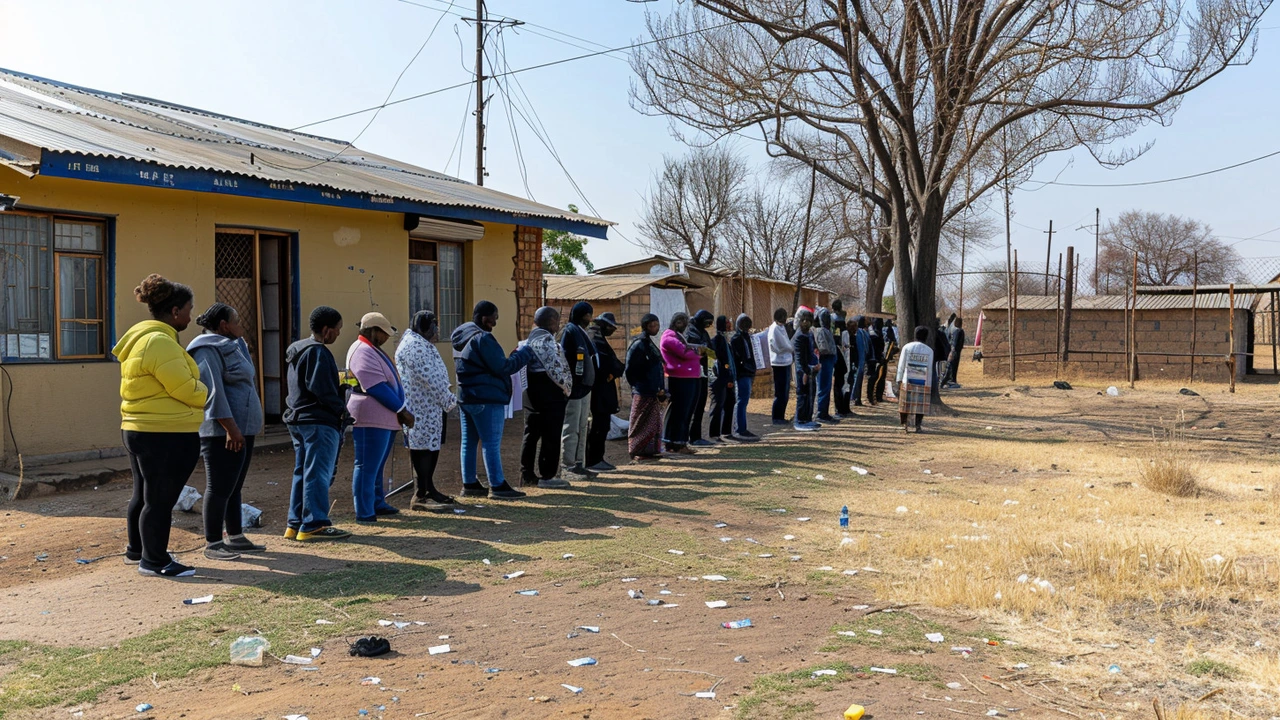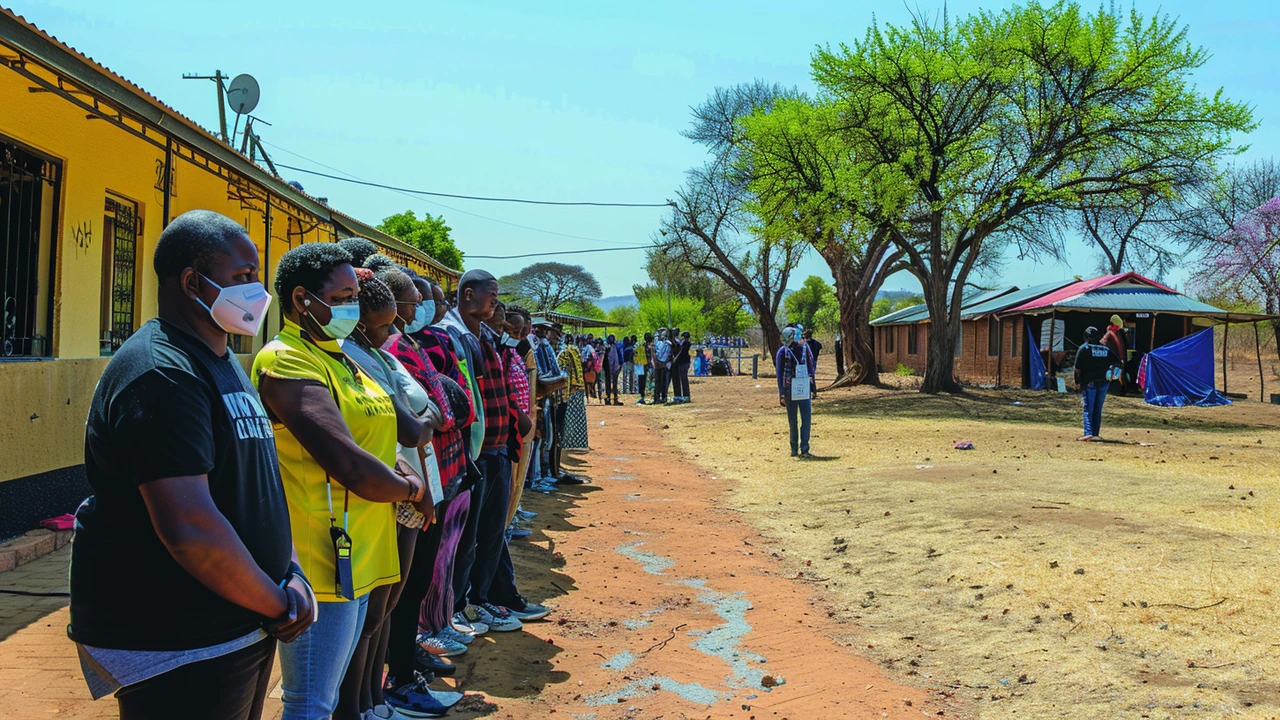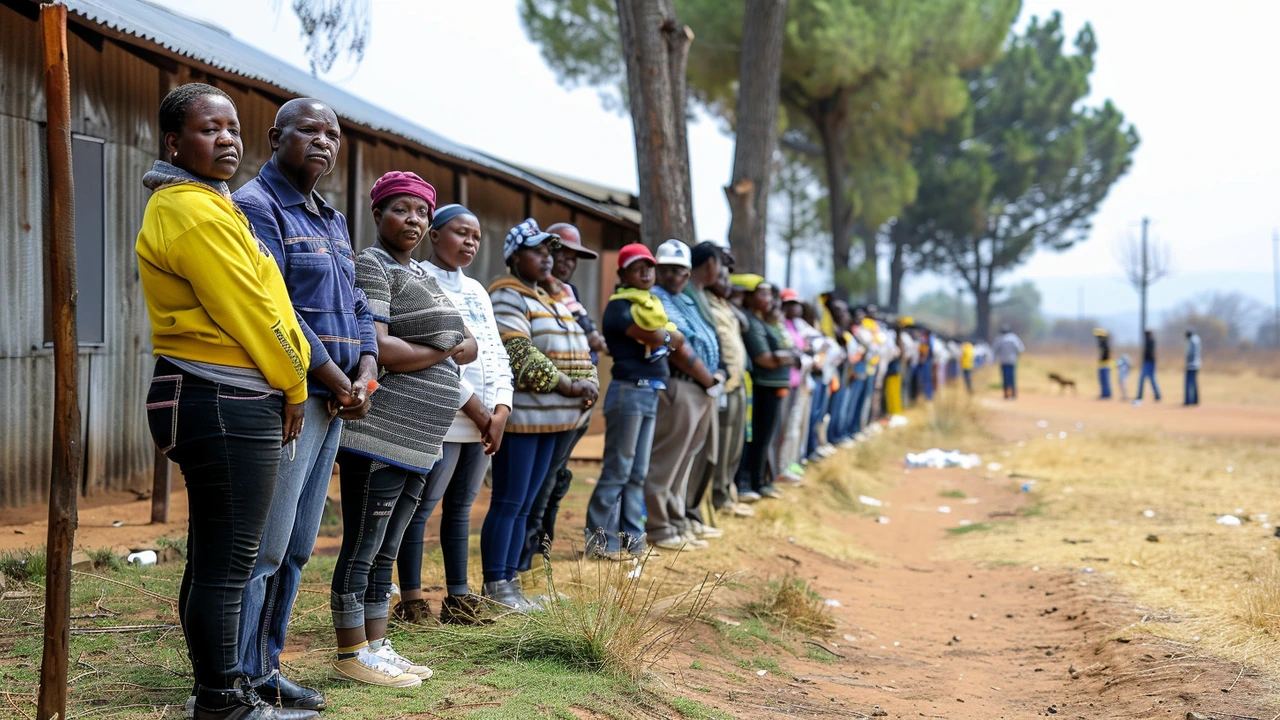30 May 2024
- 12 Comments
On May 29, 2024, Mahikeng became a focal point of democratic fervor as citizens from various walks of life converged at the Signal Hill Primary School voting station to cast their ballots. This voting station, which serves a community of more than 3,000 registered voters, saw a steady stream of individuals, each eager to make their voice heard. Among the voters were seasoned elderly citizens, young adults, and a notable contingent of first-time voters, all united by a common desire for political change. The scene was a microcosm of South Africa's diverse electorate, bound together by shared hopes and frustrations.
Moeti Setlhogo, a 70-year-old man, and his wife, Kebadirileng, were among the first to arrive at the station. Attempting to evade the anticipated long queues, they epitomized the dedication and patience required to participate in this democratic exercise. "We came early to avoid the rush," Moeti said, his determination evident. For Setlhogo and many others in his age group, the act of voting transcends mere civic duty; it represents a profound hope for a future that honors their sacrifices and achievements.
The spirit of youthful determination was equally palpable at the voting station. Onkabetse Mokwena, a 26-year-old unemployed individual, stood out among the younger voters. Disillusioned by what he perceives as the African National Congress (ANC)’s failure to deliver on its promises of job creation and essential services, Mokwena was resolute in his decision not to support the governing party. "I know what I don’t want, and that's more of the same," Mokwena stated, reflecting the sentiments of a significant portion of the youth who are increasingly seeking alternatives in an evolving political landscape.
The day also witnessed first-time voters stepping into the arena of democracy with a mix of enthusiasm and apprehension. Their participation underscored a generational shift and echoed a broader national trend of increased political engagement among South Africa's youth. The enthusiasm wasn't dampened by the lengthy wait times, which averaged around three hours by midday. This significant wait did little to deter the spirits of the electorate. Instead, it became a testament to their resolve to influence the country's direction.
While waiting in line, voters were met with entrepreneurial hustle. Local vendors set up stalls, turning the queues into makeshift markets selling snacks and refreshments. This spontaneous marketplace provided not just sustenance but also a sense of community, reflecting a uniquely South African blend of resilience and conviviality. "We saw an opportunity to cater to the needs of voters and also make a little money," said one vendor, busy serving a line of eager customers.
Among the many stories of the day was that of Elias Modibedi, another voter articulate in his critique of the status quo. "We've seen very little progress despite all the promises," he remarked, his words resonating with many who have grown weary of waiting for the transformative change that has been slow to materialize. For Modibedi and countless others, the act of voting is a declaration of their demand for accountability and efficacy from political leaders.
The Broad Spectrum of Hope
The energy at the Signal Hill Primary School voting station was indicative of a broader dissatisfaction with the current political structure. Many voters expressed a desire for new leadership that could more effectively address their needs. The diverse turnout—from the elderly reflecting on decades of political change, to the young adults energized by new ideas—showcased the wide range of hopes pinned on this electoral process.
This dynamic environment underscored the complexities of the South African political landscape. While dissatisfaction with the ANC was a common theme, opinions varied widely on which alternative parties could best steer the country forward. Some voters were still deciding between emerging parties that promise radical change and more established opposition parties that offer centrist reforms. This exploration of political options illustrates the electorate's nuanced and discerning nature.

The Stakes of Engagement
The stakes in this election cycle couldn't be higher. For many, the vote symbolizes an opportunity to correct the course of a country grappling with socioeconomic challenges. High unemployment rates, particularly among youth, persistent service delivery issues, and a perceived erosion of public trust have coalesced to make this one of the most pivotal elections in recent memory. The palpable sense of urgency among voters is a reflection of their vested interest in the nation's future.
Community leaders have been vocal about the importance of participation. "Every vote counts, and this is our chance to shape our destiny," said a local activist addressing a gathering of voters. Such rallying cries have not gone unheeded, with turnout indicating a robust commitment to democratic engagement. The narrative of this election is thus shaped not just by political parties but by the electorate's active investment in the outcome.
As voting proceeded, the logistical challenges became apparent. Despite the best efforts to manage queues efficiently, the sheer volume of voters meant extended waits. However, this did not deter people from attending. For many, the wait was a small price to pay for the potential of substantive change. Voters chatted animatedly, shared their reasons for attending, and discussed their visions for South Africa—a collective exercise in hope and democracy.

An Evolving Political Complexion
As the day wore on, it became increasingly clear that this election might mark a significant shift in South Africa’s political landscape. The disillusionment with the ANC, once an unassailable political force, was a recurring theme. Younger voters, in particular, seemed to spearhead the quest for political alternatives. This demographic shift indicates a broader evolution in political priorities, with contemporary issues like employment, education, and technological advancement taking center stage.
Political analysts have noted that the growing discontent with traditional political structures could pave the way for a reinvigorated democratic process. "The younger generation is driving a new narrative focused on pragmatic solutions rather than historical loyalty," remarked one analyst. This evolving political complexion is expected to have significant ramifications for future policy directions, potentially fostering innovation and inclusivity in governance.
Looking Forward
As the votes are counted and results anticipated, the collective hope is that the outcomes will reflect the electorate's desire for meaningful change. The voter turnout at Mahikeng is a poignant reminder of democracy’s power and fragility. It underscores the importance of each individual’s voice in the grand mosaic of national governance.
Whether the electoral outcome leads to immediate change or sets the stage for future reform, the day’s events have already made an indelible mark on Mahikeng’s narrative. The blend of seasoned wisdom, youthful enthusiasm, and first-time resolve encapsulates the essence of a society in transition—one that is reclaiming its agency and shaping its destiny.
In conclusion, the Mahikeng election day was more than a procedural formality; it was a vibrant display of democratic engagement. It bore witness to a community united in its quest for a better future, capturing the essence of a collective journey toward political renewal. As the dust settles and the political landscape potentially reconfigured, one thing remains clear: the people of Mahikeng have spoken, and their message is one of hope and change.


Charlotte Hewitt
May 30, 2024All these volunteers at the polling station are probably just paid actors for the globalists' agenda.
Jane Vasquez
May 30, 2024Wow, another day of watching the ANC scramble like a clueless chimpanzee 🙄. Nothing says 'progress' like promising everything and delivering a big, fat nothing.
Hartwell Moshier
May 31, 2024I think voting is important but the lines were long. Still it felt good to be there
Jay Bould
May 31, 2024Seeing the community come together reminded me of the vibrant street markets back home in Delhi – the mix of politics, food, and chatter is pure South African spirit.
Mike Malone
May 31, 2024It is a profound observation that the act of voting, when viewed through the lens of democratic theory, functions not merely as a procedural ritual but as a symbolic affirmation of collective agency; indeed, each ballot casts a ripple upon the vast ocean of governance, subtly reshaping the contours of power. The constituency of Mahikeng, by assembling at Signal Hill Primary School, demonstrated a remarkable convergence of generational perspectives, thereby enriching the democratic tapestry with threads of experience, aspiration, and inaugural enthusiasm.
One might argue that the presence of elderly voters like Moeti Setlhogo conveys a temporal continuity, anchoring the present to a legacy of struggle and sacrifice, while the youthful vigor of individuals such as Onkabetse Mokwena signals a forward‑looking impetus for reform.
The juxtaposition of these cohorts underscores the dialectical tension inherent in any vibrant polity – the tension between reverence for historical achievements and the imperative for innovative solutions to contemporary challenges.
Moreover, the spontaneous marketplace that emerged within the queues exemplifies the adaptive resilience of civil society, transforming bureaucratic inconvenience into an opportunity for micro‑economic exchange and communal solidarity.
From a sociopolitical perspective, such organic entrepreneurial activity not only alleviates the material discomfort of prolonged waiting but also reinforces social cohesion, fostering a shared narrative of perseverance.
It is equally noteworthy that the vocal discontent expressed toward the ANC reflects a broader paradigm shift, wherein electorates across the continent are recalibrating their expectations of governance, demanding accountability, transparency, and tangible outcomes rather than rhetorical platitudes.
In this light, the explicit repudiation of the status quo by voters like Elias Modibedi encapsulates a collective yearning for substantive transformation, a sentiment amplified by the palpable frustration of high unemployment and service delivery deficits.
The confluence of these factors suggests that the forthcoming electoral outcomes may well serve as a catalyst for political realignment, potentially ushering in a new era of pluralistic competition and policy innovation.
Nevertheless, it would be remiss to disregard the procedural challenges manifested in the extensive queuing times; such logistical constraints, while symptomatic of administrative shortcomings, also reveal the depth of civic commitment wherein citizens willingly endure hardship for the promise of change.
In sum, the Mahikeng voting day stands as a microcosm of South Africa's democratic evolution – a tableau wherein hope, disillusionment, entrepreneurship, and intergenerational dialogue intersect, forging a narrative that is both cautionary and inspiring.
Future scholars will likely cite this event as an illustrative case of participatory resilience, underscored by the indomitable spirit of a populace determined to shape its destiny.
Pierce Smith
May 31, 2024While emotions run high, it’s essential we keep the dialogue constructive; the collective desire for better services is evident, and recognising common ground can guide us toward viable alternatives.
Abhishek Singh
May 31, 2024Another day, another excuse from the ruling party, same old promises, same empty results.
hg gay
May 31, 2024❤️ It’s amazing to see so many faces, old and young, coming together for a common cause. The patience shown during those three‑hour queues is a testament to the deep hope many hold for a brighter future. I felt a surge of optimism watching families share stories, vendors offering comfort food, and kids playing in the corners. This kind of community spirit reminds us that democracy isn’t just about ballots; it’s about the human connections forged in the process. Let’s hold onto this momentum and keep supporting each other, no matter what the results bring. 🌍
Owen Covach
May 31, 2024Vibes were electric and the line felt like a festival of change.
Pauline HERT
May 31, 2024Patriotic pride demands we hold our leaders to the highest standards, and when they falter, we must speak out loudly.
Ron Rementilla
May 31, 2024Observing the diverse turnout highlights how inter‑generational dialogue is crucial for shaping policies that truly serve all citizens.
Chand Shahzad
June 1, 2024Indeed, the philosophical depth presented earlier underscores the necessity of aligning electoral aspirations with pragmatic governance; this alignment will ensure the energy witnessed translates into sustainable development.